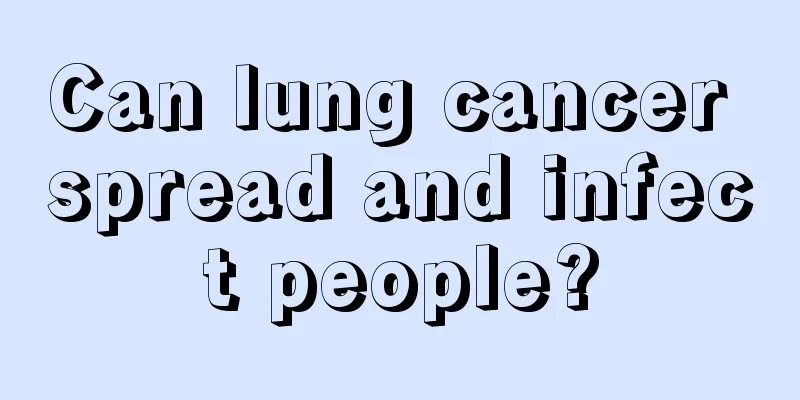Can lung cancer spread and infect people?

|
Lung cancer cannot be transmitted to others because it is not caused by infectious pathogens such as viruses and bacteria. Instead, it is a cancer caused by genetic mutations in body cells. Therefore, normal contact, communication, and even sharing of items will not spread lung cancer. Lung cancer is caused by a combination of complex internal and external factors, including long-term smoking, exposure to secondhand smoke, air pollution, occupational exposure (such as asbestos, chemical toxins), and family heredity. The spread of lung cancer is the process of cancer cells migrating to other organs in the body through the blood circulation or lymphatic system, and has nothing to do with any external infectious source. However, excessive worry after the discovery of lung cancer may affect the mental health of patients and their families, so appropriate treatment strategies need to be matched as soon as possible. Treatments include surgical resection (for early patients), radiotherapy and chemotherapy (for advanced or locally spread cases), and molecular targeted drug therapy (such as osimertinib, erlotinib, crizotinib), the latter of which has better sensitivity to specific gene mutations such as EGFR. Immunotherapy such as PD-1 inhibitors have also become emerging treatment options. Lung cancer is caused by a combination of complex internal and external factors, including long-term smoking, exposure to secondhand smoke, air pollution, occupational exposure (such as asbestos, chemical toxins), and family heredity. The spread of lung cancer is the process of cancer cells migrating to other organs in the body through the blood circulation or lymphatic system, and has nothing to do with any external infectious source. However, excessive worry after the discovery of lung cancer may affect the mental health of patients and their families, so appropriate treatment strategies need to be matched as soon as possible. Treatments include surgical resection (for early patients), radiotherapy and chemotherapy (for advanced or locally spread cases), and molecular targeted drug therapy (such as osimertinib, erlotinib, crizotinib), the latter of which has better sensitivity to specific gene mutations such as EGFR. Immunotherapy such as PD-1 inhibitors have also become emerging treatment options. Although lung cancer is not an infectious disease, support from those around you is important. When caring for patients, you can pay attention to creating a clean environment and help patients stay away from tobacco and pollution. Family members should pay attention to their health management in their lives with patients. If there is a family history of lung cancer, they should undergo regular low-dose CT screening and quit smoking to reduce the risk. For unavoidable psychological pressure, it is recommended to consult a professional doctor or psychologist to help patients and their families cope with the challenges of the disease and quality of life together. |
<<: 28-year-old with multiple hamartomas in both kidneys
>>: Can prostate cancer be detected? How long can one live?
Recommend
Can I drink alcohol with braces?
You can drink alcohol while wearing braces, but y...
Are cherries good for the eyes?
Cherry is a kind of fruit that people eat in dail...
How many days does it usually take to be discharged from the hospital after liver cancer interventional surgery?
How many days can a patient be discharged from th...
What are the main types of personality cognitive disorders?
Patients with personality and cognitive disorders...
Will it be a shadow if my husband accompanies me during childbirth
There are actually many benefits to having your h...
What causes intestinal bloating? Mostly this factor!
In life, many people will experience gas in their...
How long does it take to ferment steamed buns in summer
The desired changes will determine the fermentati...
How much is the total cost of osteosarcoma surgery
The treatment of osteosarcoma must be timely. Man...
How to improve elbow tendon strain
Elbow tendon strain needs to be improved and reso...
Bench press elbow pain
The bench press is a fitness exercise that has a ...
How to diagnose primary liver cancer in its early stages? Issues regarding early diagnosis of primary liver cancer
Because the liver is hidden deep in the upper abd...
Symptoms of prostate cancer liver metastasis
It is very scary for male friends to suffer from ...
What are the methods to prevent intestinal polyps
The incidence of intestinal polyps is relatively ...
Is fetal heart rate of 160 normal?
If the test result is a fetal heart rate of 160, ...
Drink a glass of water in the morning, you will see visible changes in your body, you must drink it
Do you know? The "water" you drink play...









